Immersive culinary experts Bompas & Parr bring an exclusive one-of-a-kind dining experience to EXPO 2020 Dubai – a feast of aerogels and edible luminescence, leading guests on multi-sensory journey with glow-in-the-dark creations and flavour-changing desserts.
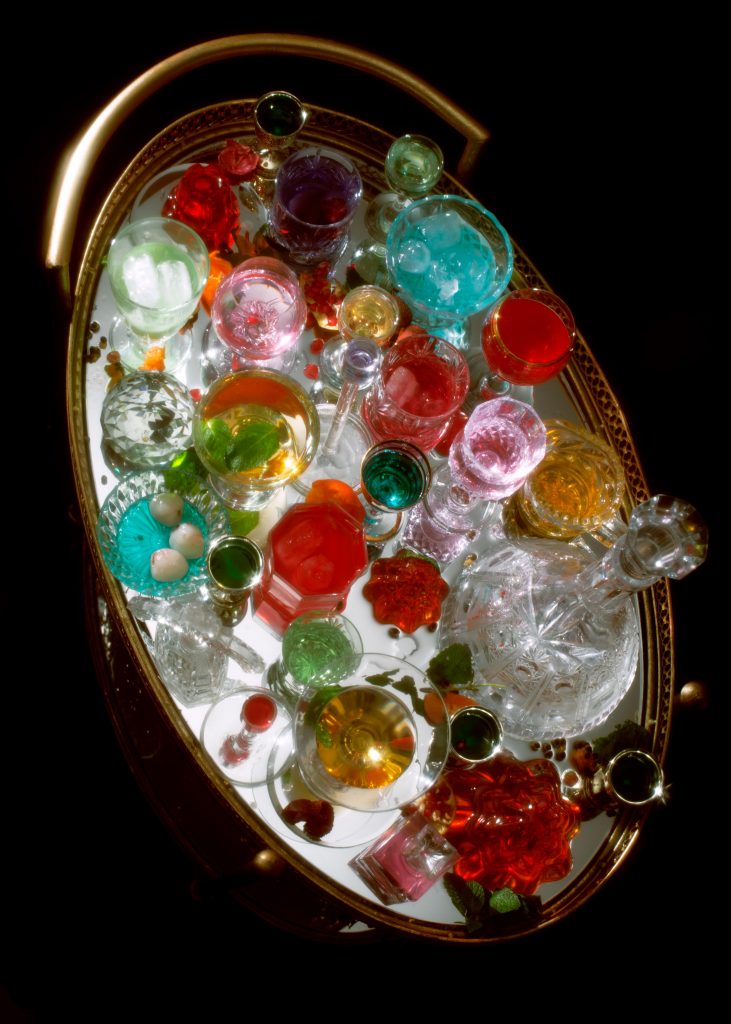
A pioneering culinary experience inspired by space, microbiology, artificial intelligence and hyperintelligence will stir the senses of curious diners at Expo 2020 Dubai, in a new concept designed to challenge the future of dining.
The Future of Food: Epochal Banquet is a never-before-seen experience cooked up by UK-based multi-sensory experience design studio Bompas & Parr, in collaboration with Expo 2020. The ground-breaking foodie adventure will feature numerous world firsts, taking creativity, innovation and technology to a new level.
Diners will have the opportunity to taste super-light delicacies formed using the same technique that NASA uses to collect comet dust; edible creations that glow in the dark; flavour-changing desserts; ultra-rare ingredients, including new-to-the-plate plants; and much more.
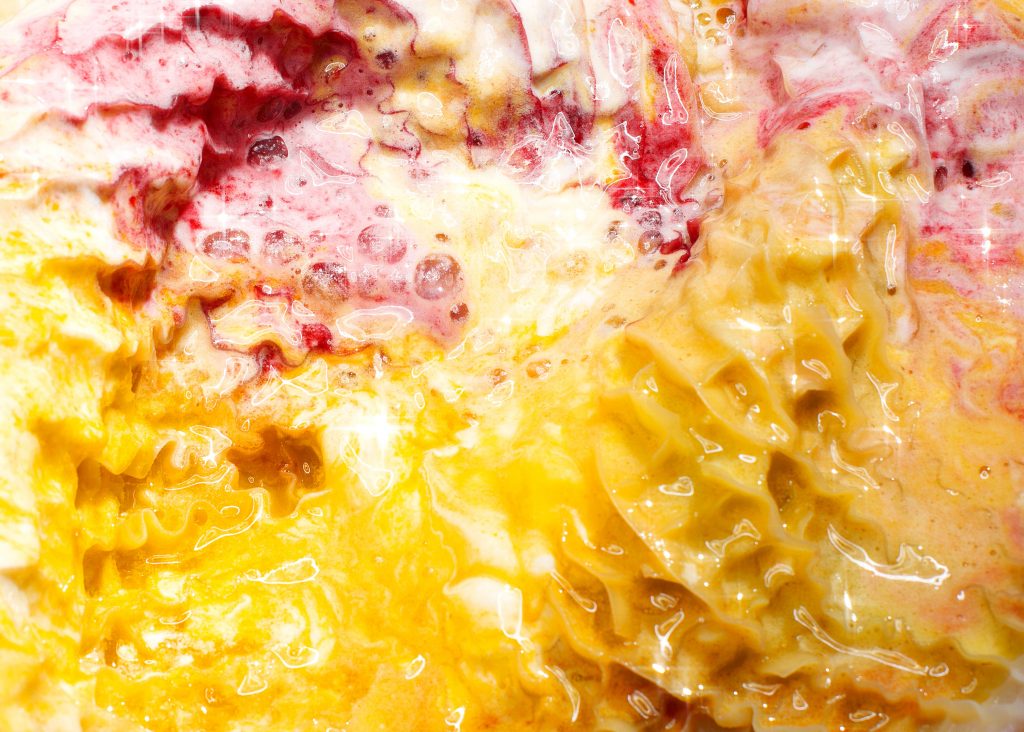
World-first highlights from the menu include:
- Aerogel meringues
- Transgenic collagen-infused sauce in a glow-in-the-dark starter
- Vegan bone marrow
- Herbs grown in a high CO2 environment simulated to resemble that of the year 2220
- Flavour-changing jelly accompanied by a biologically metallic iced sphere
- Future dream-inducing chocolate
- The taste of foods inspired by the UAE Space Agency
The full menu is designed to entertain and inspire, while exploring important themes involving the future of food, including how humans and artificial intelligence can combine to sustainably feed a growing global population and tackle food waste, as well as the implications for future nutrition. The theatrical experience is based on The Novacene, a publication by eminent 102-year-old scientist and inventor James Lovelock, which hypothesized the dawning age of hyperintelligence where robots and artificial intelligence will rule. The new age, he prophesizes, will take over the ‘Anthropocene’ era, with Lovelock himself interviewed for the project.
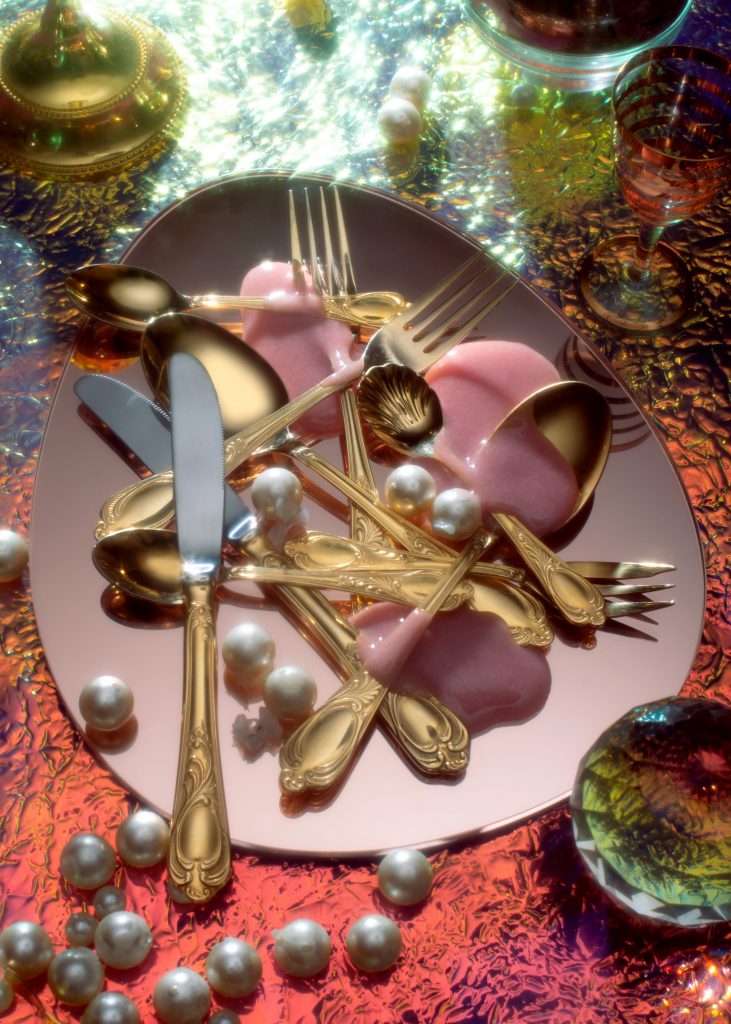
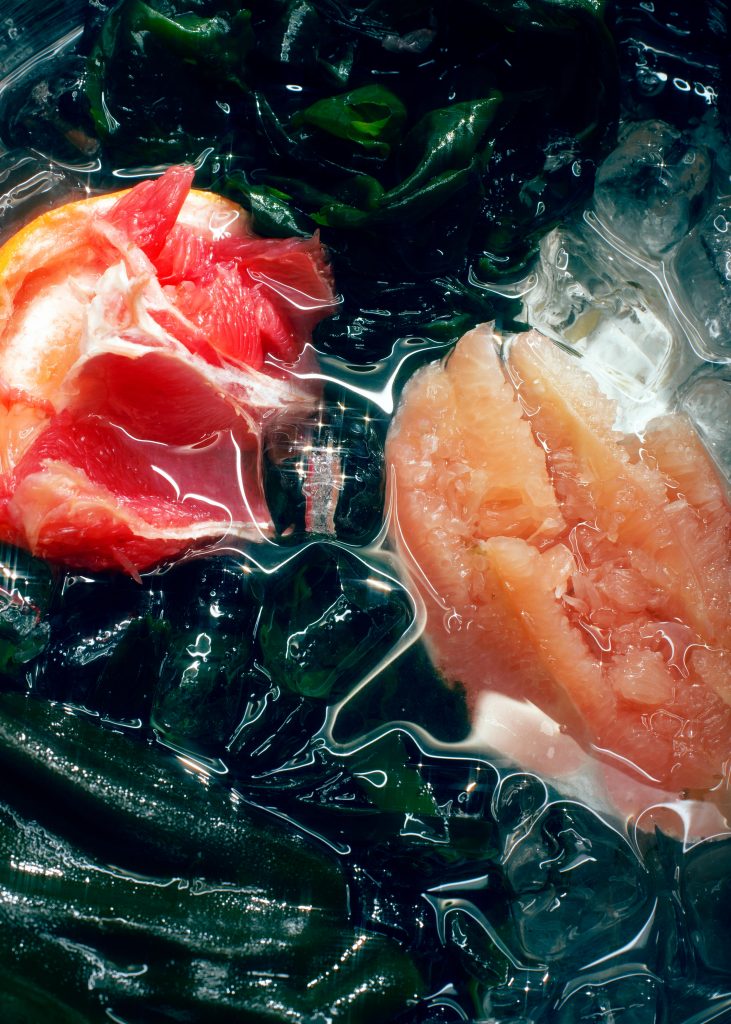
Reception on arrival – The Universal Museum of Food – 2320
Visitors are invited to the opening of The Universal Museum of Food set in the year 2320, the era of Lovelock’s Novacene. The techno-fictional museum presents a history of food, one based on the very best contemporary science and stretching from Expo 2020 to three hundred years later.
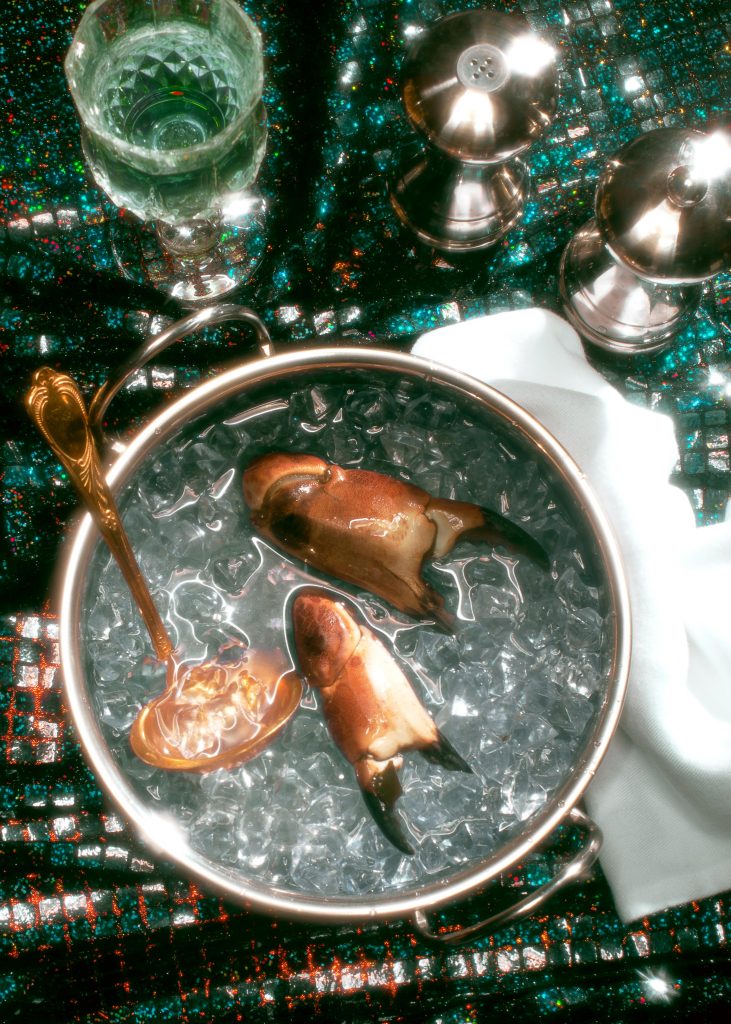
Bompas & Parr has collaborated with numerous innovators, scientists and creative technologists to gather thoughts on how we will eat in centuries to come and allow you to taste it today.
Canapés upon arrival include a selection of never-before-seen dishes, such as Mammoth Tartare, Aerogel Meringues, Crisps of 1000 Flavours, and canapés inspired by UAE Space Agency mission foods.
All dishes throughout the meal are paired with drinks ranging from unique interstellar beverages to hand-picked fine grapes.
Starter – Imminent Future, 2021
Informed by Geltor’s bio designers, this epoch will deliver a hyper-personalised glowing dish that imagines a world in which transgenic vegan food has incorporated animal-identical proteins. The dish also has a spectacular luminescent effect.
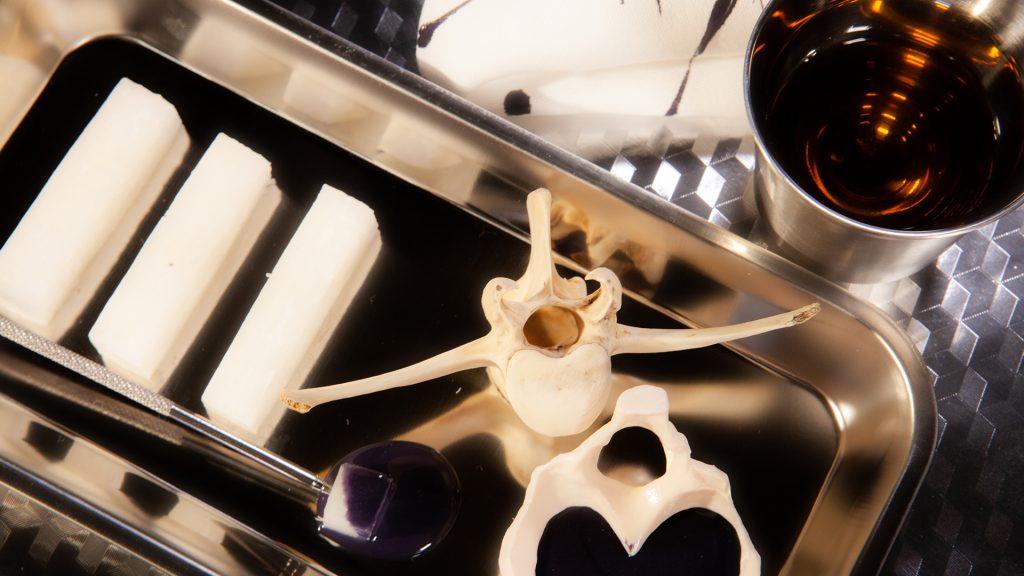
An entrée of shiitake and kow choi dumplings in a luminescent seaweed broth, garnished with pickled accoutrements and seasoned according to your personality.
Abigail Yun, Chief of Staff at Geltor explains, “There’s a whole industry growing up where we are discovering new ways to make compounds with far less resources: water, land use and greenhouse gas emissions. You can literally flip a switch on a microbe and get it to secrete a compound in the most pure form possible. These compounds can take a plant-based burger to the next level, so consumers can enjoy the same mouthfeel, texture, even nutritional profile [as meat].”
Interlude – AI Dystopia, 2120
Developed with insights on future agriculture with Dr Alexandra Sexton, Research Fellow at the University of Sheffield, the gnarly inter-course characterises a future of sustainable synthesised meat and lab-perfected proteins.
An interlude of vegan bone marrow with burnt butter, topped with crisp croutons.
Main course – The Gaia, 2220
The pinnacle main course will expose diners to an edible earth, garnished with herbs grown in the year 2220, as simulated in climate chambers by scientists at the University of Sheffield. These new-to-the-plate plants will pre-empt a future Eden where hydroponic farms will shape our future cityscapes.
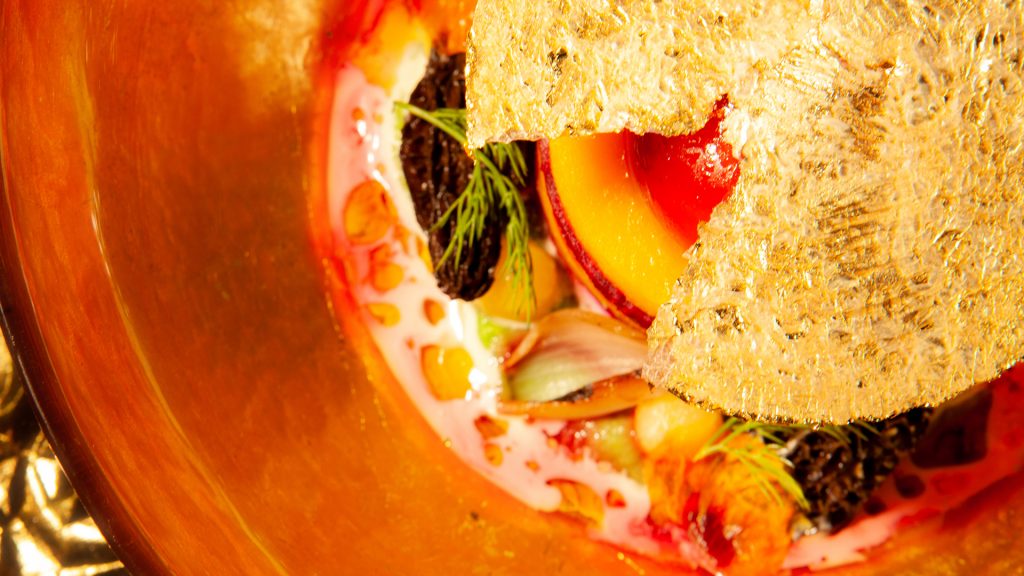
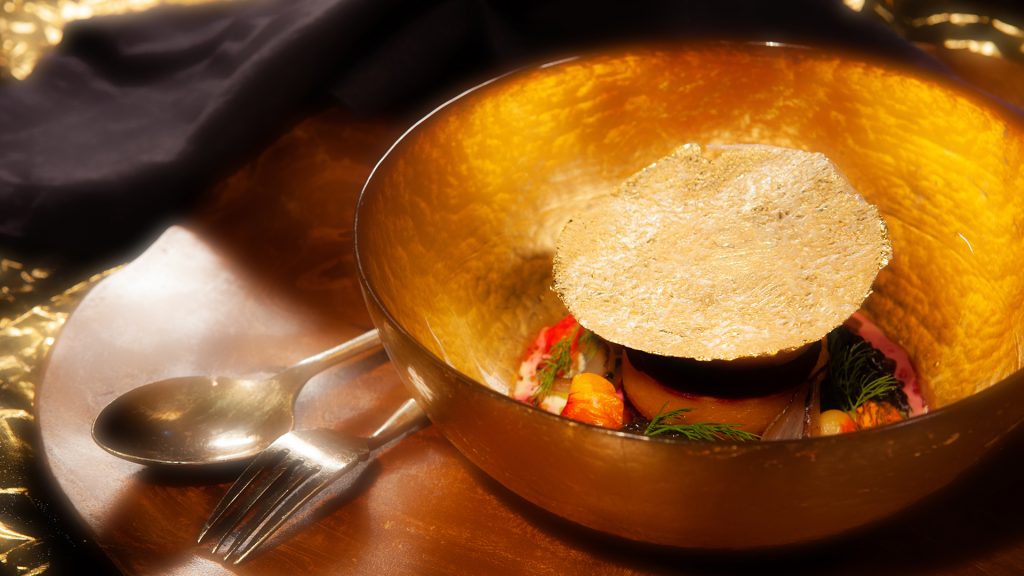
A golden chestnut wafer tops a marble-cured duck yolk, rolled lamb belly, a terrine of rouge crapaudine and trumpet squash, served with a fricassée of morel mushrooms and a pea emulsion. (Vegetarian option available).
Duncan Cameron, Co-Director at The Institute for Sustainable Food and Professor of Plant and Soil Biology at The University of Sheffield, suggests ways in which, “We can start to use spaces in our cities to create hydroponic farms, and further in the future, even use AI to make up for the decline in pollinating insects by creating swarms of mini pollinating robots with virtual bee brains.”
Dessert – The Novacene, 2320
Dessert is served in The Novacene, a hypothesised age of unbridled creativity. Food has always been entertaining – as a social forum as well as in itself. It has also always been joyful – a wondrous expression of human sophistication and artistry. The enchanting banquet dessert comes as a result of extensive experimentation by University of Cambridge’s Department of Chemistry to develop a structural pigment based on pollia condensata berries, the world’s shiniest living thing. The Bompas & Parr development kitchen has then used this to create an iridescent glaze that looks holographic. Working with principles developed by Prof. Charles Spence of the University of Oxford’s Department of Experimental Psychology, the jelly component of the dessert changes flavour.
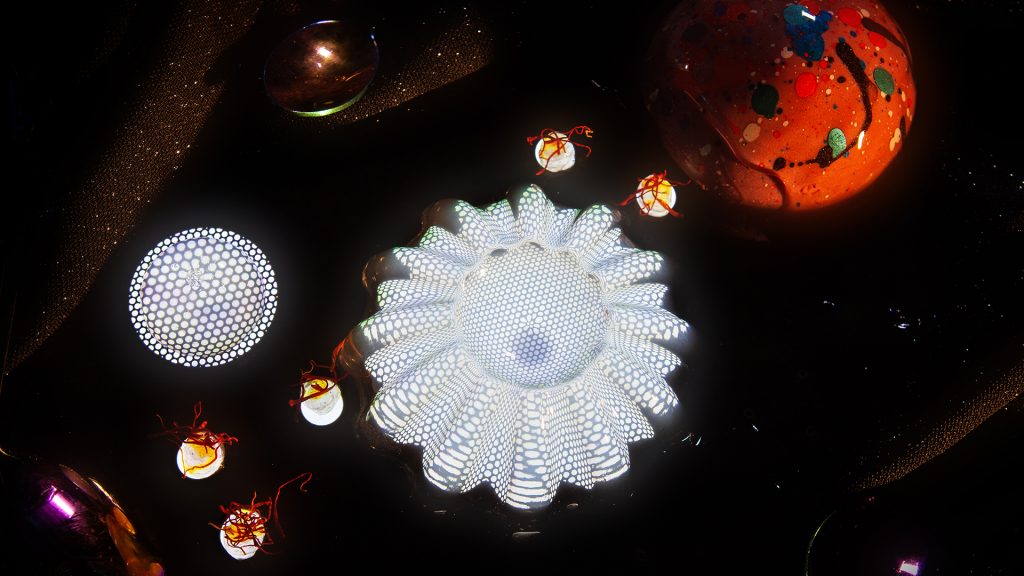
The spectacular finale is a dessert of flavour-changing jelly, with an iridescent knafeh iced sphere and botanicals.
Prof. Silvia Vignolini of the Department of Chemistry at University of Cambridge notes, “From a biological point of view, the pollia berry is interesting because its bright metallic colour comes from the way that the cellulose is structured in the cell, rather than pigment.”
The meal aspires to gather together edible futurity from around the planet and gather them together in a single installation at Expo 2020 Dubai.
Marjan Faraidooni, Chief Experience Officer, Expo 2020 Dubai, said: “Our World Expo is a global experience that will offer an endless journey of discovery – including through food and beverages. The Future of Food immersive experience is extremely exciting, offering foodies and the curious a world-first taste of the culinary experiences of tomorrow, while also delving into pressing global challenges based around food security and how innovation and food will combine in the future.”
Known for its genre-defining projects, Bompas & Parr rose to prominence with its jelly creations that take architectural forms, such as Grimshaw’s The Eden Project and Lord Foster’s wobbly Millennium Bridge. The experiential firm is behind the world’s first multi-sensory fireworks display, commissioned for New Year’s Eve 2013 in London, and the world’s first cultural institution solely dedicated to food and drink, the British Museum of Food, which opened in 2015.
Sam Bompas, Director, Bompas & Parr,said: “We are thrilled to be bringing The Future of Food: Epochal Banquet to a global audience at Expo 2020 Dubai, where we hope to inspire diners to think positively about the reality of technology-infused dishes. Each course will take guests deeper into the future through first-of-its-kind dishes, as well as immersive experiences that stir each of the senses.”
Available throughout the six months of Expo 2020, tickets for the two-hour adventure are expected to sell fast. They are available to purchase at www.expo2020dubai.com/en/plan-your-visit/where-to-eat/future-of-food.
The curated experience features a multi-course exploratory menu, designed to entertain and inspire, while exploring important themes involving the future of food, including how humans and artificial intelligence can combine to sustainably feed a growing global population and tackle food waste, as well as the implications for future nutrition.
A food destination in its own right, with 200-plus food and beverage outlets offering a world of cuisines and innovative concepts, Expo 2020 will ensure there is something new for everyone to taste. Coupled with up to 60 live events – including film nights, poetry readings, art activations, musical concerts, cultural tours, parades and interactive journeys for all ages – the site will be alive with sounds, rhythms and flavours from across the globe.
Expo 2020 runs from 1 October 2021 to 31 March 2022, inviting visitors from around the world to join the making of a new world and experience a six-month celebration of human creativity, innovation, progress and culture.
Note: The experience is not suitable for guests under 14 years of age and features strobe lighting that may affect those with sensory sensitivities. As part of the shared experience, diners are seated at a communal table, which conforms to COVID-19 measures.
